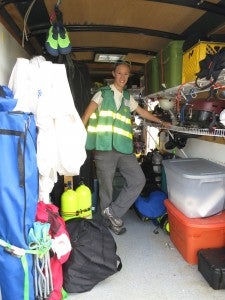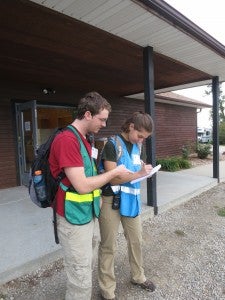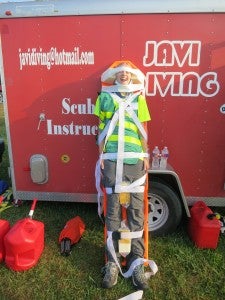Missouri Hope
 Stepping onto Georgetown’s campus three years ago, I had already been told of the importance of the Spirit of Georgetown and its accompanying nine values. Over the past weekend with the help of an extremely generous grant from Campus Ministry, I was able to fully live out some of these values as a Jesuit Universities Humanitarian Action Network (JUHAN) Fellow working as a overwater rescue staff member at a domestic disaster response field training exercise in Maryville, Missouri.
Stepping onto Georgetown’s campus three years ago, I had already been told of the importance of the Spirit of Georgetown and its accompanying nine values. Over the past weekend with the help of an extremely generous grant from Campus Ministry, I was able to fully live out some of these values as a Jesuit Universities Humanitarian Action Network (JUHAN) Fellow working as a overwater rescue staff member at a domestic disaster response field training exercise in Maryville, Missouri.
Missouri Hope or MO Hope as the training is called locally, places around forty-five participants in a scenario that is designed to replicate the early aftermath of the natural disaster, similar to the Joplin tornado of 2011. All participants are given a brief overview of what it means to be a first responder in a crisis and are taught some crucial skills such as how to ensure their own safety and of course, triage.
Coming to the exercise as a staff member, I already had some baseline knowledge of these skills and my duty was to first help ensure the safety of the participants and they participated in my lane of the simulation, which was an overwater rescue lane for people who are trapped in rising floodwaters. This lane was designed so that participants would have to arrange transportation for victims (who are played by role players covered in moulage) to a designated field hospital, triage all victims on site, communicate back to the Incident Command Post (ICP) all while ensuring their own safety. However, it was not only my participants who learned new skills as I easily learned as much on hard knowledge on my lane as they did. Coming back from Missouri, I am now able to spinal board a injured  person and load them into a boat, can better triage a person and how to treat the emotional and psychological wounds that a victim of such a disaster incurs along with their physical injuries. Yet, there is still more that I learned after reflecting on the experience for a few days and tying it back to the key values I have as a Hoya.
person and load them into a boat, can better triage a person and how to treat the emotional and psychological wounds that a victim of such a disaster incurs along with their physical injuries. Yet, there is still more that I learned after reflecting on the experience for a few days and tying it back to the key values I have as a Hoya.
One of most important things I have learned at Georgetown is that I have a duty to serve others because of all the privilege I have received throughout my life, which directly comes from our value of Women and Men For Others. Working at MO Hope reaffirmed this commitment as I spent three and a half days learning how I can both best serve survivors of a domestic natural disaster as well as best teach others to have the same skills. And oftentimes, this commitment is a difficult one as you quickly learn as an emergency responder that you cannot save everyone. In any emergency response to a disaster, people are going to die despite all of your attempts to the contrary and that is not something that is easy to accept as someone who just wants to help other people overcome their suffering. I also learned that emergency response is never as simple as splinting a broken arm or bandaging a bleeding head. Rather, it requires that you see all the survivors as actual people and that you recognize their own unique circumstances and care for them on all levels with those circumstances in mind. To me, this sounds a lot like Georgetown’s value of Cura Personalis and it seems like it should be easy to do until you are in high stress situation surrounded by screaming, dying people and you just want to quickly deal with one person in a robotic fashion so you can quickly move into the next. But you cannot do this as an emergency responder and reflection has helped me tie it back to  Cura Personalis and the role this value must play in my own life.
Cura Personalis and the role this value must play in my own life.
So upon leaving MO Hope, I walked away with a lot of improved hard knowledge as well as a lot of material to reflect on in the upcoming days and weeks. These reflections have already made me extremely grateful to Campus Ministry for giving me this opportunity, as I know this experience will allow me to better claim the title of a JUHAN fellow and to become a true living embodiment of our Georgetown values.
Zoë Mowl , SFS ’15
- Tagged
- Service